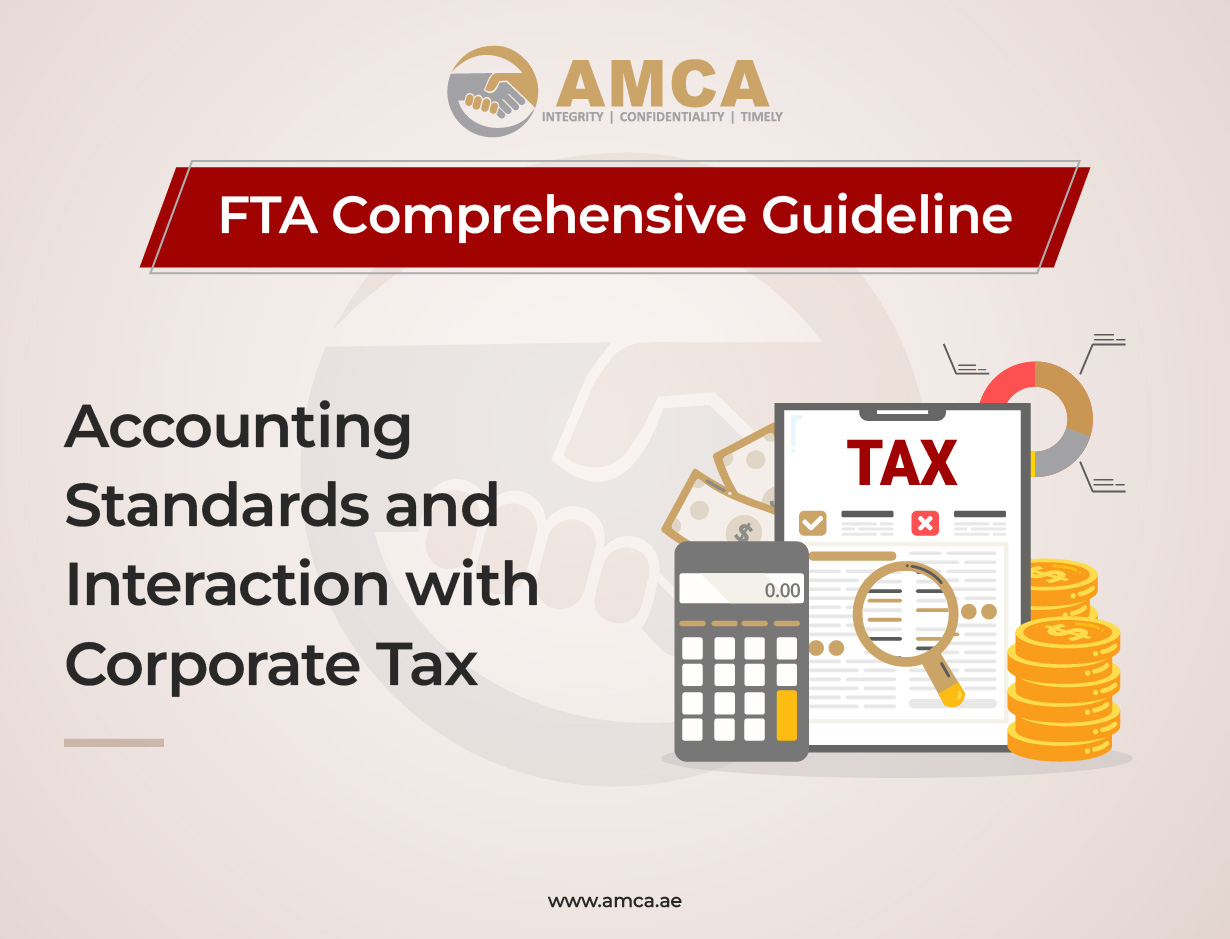
20 Dec 2023
Pertaining to the implementation of Corporate Tax in UAE, the FTA issued a comprehensive guideline on “Accounting Standards and Interaction with Corporate Tax” on 9th November 2023.
For businesses to achieve prudent financial practices and seamless compliance, it becomes paramount to have an extensive understanding of the guidelines.
What is this guide about?
Although not a legally binding document, this general guide extensively elaborates on the applicability of accounting standards with Corporate Tax. It consists of an overview of the Accepted Accounting Standards, Accounting methods for calculating Corporate Tax, Accounting adjustments, Audit Requirements and Financial Statement preparation.
IFRS and IFRS for SMEs: The Accepted Accounting and Reporting standard
The accepted accounting standard for Corporate Tax compliance is the International Financial Reporting Standard (IFRS). However, the International Financial Reporting Standard for Small & Medium Sized Businesses (IFRS for SMEs) can be used by a taxable person if their revenue in a tax period does not exceed 50 million AED. This is to note that IFRS for SMEs should not be used as a default accounting standard, and the Taxable Person may use IFRS for SMEs only if they satisfy the Revenue requirement. Where the requirement is not satisfied, IFRS shall be used.
The Corporate Tax law states that the determination of taxable income by a taxable person should be done separately on the basis of Standalone (unconsolidated) Financial Statements (using IFRS or IFRS for SMEs), prepared in accordance with Corporate Tax.
Accounting Methods
The accounting methods discussed in the guidelines are:
- Accrual basis of accounting
- Cash basis of accounting
- Realisation basis of accounting
Their eligibility, application, and modification according to the Corporate Tax are also discussed.
Accrual Basis of Accounting
In this financial accounting method, the revenues and expenses are recognised when earned or incurred rather than when payments are received or made.
Cash Basis of Accounting
- When revenue and expenditure are recorded or counted only when the cash is received or paid, this practice is called cash basis of accounting. This method of accounting applies equally to both revenue and expenditure recognition. Moreover, the Cash Basis of Accounting does not incorporate a balance sheet.
- This financial accounting method is eligible to be utilized for Corporate Tax when a person’s revenue does not exceed AED 3 million within the relevant tax period. Once a Taxable Person’s Revenue exceeds AED 3 million in the Tax Period, they must prepare Financial Statements on an accrual basis, except under exceptional circumstances, in pursuit of an application made by the Taxable Person and following the FTA’s approval.
- In some cases, the cash Basis of accounting can be used if the taxable person expects to exceed the AED 3 million revenue threshold for only one tax period, supported by evidence.
- If a taxable person’s revenue exceeds AED 3 million during a tax period using the cash basis of accounting, the taxable person should switch to the accrual basis of accounting. However, this can also be considered an exceptional circumstance depending on the approval of FTA after an application submission.
- Small business relief can be applied to businesses with revenue lower than AED 3 million, and in this case, the Financial Statements can be prepared using the cash basis of accounting. Furthermore, the revenue is calculated using the Cash Basis of Accounting to determine the eligibility to use this accounting method. Nonetheless, the Person can either use IFRS or IFRS for SME or Cash Basis of Accounting on revenue calculation for the purpose of Small Business Relief.
Realisation Basis of Accounting
- This method is based on the realisation principle, which states that the revenue can only be recognised or realised when the services or goods related to that revenue have been delivered.
- Realised gains or losses are those converted into actual cash or consideration by the end of a transaction, while unrealised gains or losses are those not converted into consideration.
- To prevent a tax liability, businesses can elect to account for gains and losses only upon actual asset disposal or liability settlement.
- The guideline also elaborates on the scope of the realisation basis. The election to use the realisation basis for banks and insurance providers, and other taxable persons is also elaborated, including the timeline and revocation of the election.
- Unrealised gains or losses in a taxable person’s Financial Statements are disregarded for Corporate Tax purposes until both gains and losses are realised under certain circumstances. Special adjustments are made for assets and liabilities when calculating taxable income using the realisation basis.
- “Assets on capital account” constitutes the assets that are non-trading, depreciable, or non-current assets. “Liabilities on capital accounts” are the liabilities that don’t result in deductible expenditure for Corporate Tax purposes or are treated as non-current liabilities. Additionally, “Assets and liabilities held on revenue account” refer to the assets and liabilities other than those held on capital account.
Other Adjustments to Accounting Income
Several adjustments relating to the accounting income are discussed in the accounting standard guideline. The significant elements mentioned are as follows:
- Arm’s length principle for related party transactions: Arm’s length principle must be followed while making transactions between related parties. When the consideration paid while making transactions between related parties is lower than the market value or exceeds it, adjustments must be made to ensure arm’s length results.
- Qualifying Group Transactions: In cases where assets or liabilities are transferred between members of the same qualifying group but not as part of a Tax Group, where no gain or loss relief under Article 26 (1) of the corporate tax applies, certain adjustments need to be made to the transferee’s taxable income. The adjustments during the realization of an asset or a liability and adjustments other than upon realisation are specified.
- Business Restructuring Relief: If business restructuring relief applies, adjustments in the accounting income are to be made to exclude depreciation, amortisation, or other changes in the value of assets.
- Including Realized or unrealised gains: For realised or unrealised gains and losses that are reported in the financial statements but won’t be subsequently recognised in the income statements, adjustments are to be made on their accounting income to include these gains or losses.
The guideline also mentions that Parent Companies should replace the effect of Equity Method of Accounting, if applied, with Cost Method of Accounting to avoid double taxation for Corporate Tax Purposes. Expenditure that does not meet the specific tax deduction rules is not deductible from Corporate Tax, regardless of its treatment in the Financial Statements.
Adjustments under Transitional Rule
For Corporate Tax, the opening balance sheet of a taxable person will be the closing balance sheet before the person’s first tax period. This will be considered as the starting point for Corporate Tax calculations.
- The treatment of assets and liabilities depends upon whether they are recorded on a historical cost or fair value basis.
- The transitional rules applying to Qualifying immovable property and Qualifying Intangible assets are also elaborated in the guideline. While two methods, i.e., valuation method and time apportionment method, can be used for calculating excluded gains for Qualifying immovable property, only the time apportionment method can be used for qualifying immovable intangible assets.
- The taxable income for qualifying financial assets and qualifying financial liabilities can also be adjusted. The exclusion is applicable to gains as well as losses.
- If relevant assets and liabilities are owned by other members of a qualifying group or tax group, they are considered in the excluded gains or loss calculations under the ‘look through’ provision.
- For transactions between related parties, the arm’s length principle must be followed.
Audit Requirements for Financial Statements in accordance with Corporate Tax
- Businesses and Qualifying Free Zone Persons: Businesses with revenue exceeding AED 50 million in the relevant tax period and all the Qualifying Free Zone persons are required to have their financial statements audited by UAE-registered auditors.
- Tax group: If a tax group’s consolidated revenue exceeds AED 50 million, it is mandatory for them to get their consolidated Financial Statements audited. As for the parent companies and subsidiaries, the Corporate Tax law does not require their separate Financial Statements to be audited, even when a member’s revenue exceeds AED 50 million.
- Private pension or social security funds: An annual audit needs to be maintained for private pension or social security funds that are approved by FTA as being exempt from Corporate Tax. This is to be done to ensure compliance of the funds with the provisions of Ministerial Decision No. 115 of 2023.
Preparation of Financial Statements for Tax Group
A Tax Group is required to prepare consolidated Financial Statements (using IFRS or IFRS for SMEs), for determining the Taxable Income of a Tax Group. Hence, the Financial Statements must be prepared on the basis of aggregation of the stand-alone Financial Statements of the Parent Company and each Subsidiary that is a member of the Tax Group, treating the Tax Group as a single Taxable Person. The financial outcomes, assets, and liabilities of all Tax Group members need consolidation, eradicating any transactions between the Parent Company and each Subsidiary.
How can AMCA help?
Being a reputable and reliable Corporate Tax agency, the experts at AMCA are well-versed and consistently updated with the dynamic regulations and laws of the UAE. AMCA can ensure integral Corporate Tax compliance for your business and guide you through unbeatable expertise in achieving a competitive edge and progressive financial strategies.
Secure a seamless & strong financial position for your business with AMCA!
-
Read More: Corporate Tax Federal-Decree-Law-No.-On 47-of-2022
-
Read More: Impact of UAE corporate tax reform on businesses in free zones
-
Read More: Corporate Tax in the UAE: Frequently Asked Questions




.jpg)